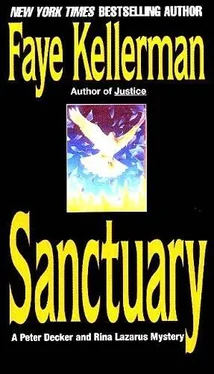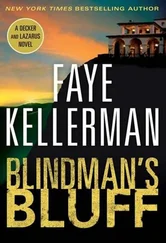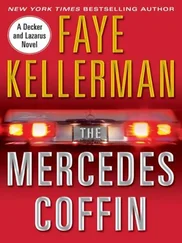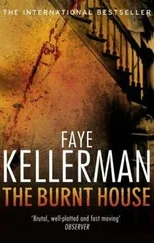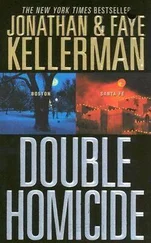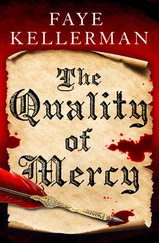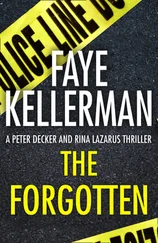Faye Kellerman - Sanctuary
Здесь есть возможность читать онлайн «Faye Kellerman - Sanctuary» — ознакомительный отрывок электронной книги совершенно бесплатно, а после прочтения отрывка купить полную версию. В некоторых случаях можно слушать аудио, скачать через торрент в формате fb2 и присутствует краткое содержание. Жанр: Детектив, на английском языке. Описание произведения, (предисловие) а так же отзывы посетителей доступны на портале библиотеки ЛибКат.
- Название:Sanctuary
- Автор:
- Жанр:
- Год:неизвестен
- ISBN:нет данных
- Рейтинг книги:4 / 5. Голосов: 1
-
Избранное:Добавить в избранное
- Отзывы:
-
Ваша оценка:
- 80
- 1
- 2
- 3
- 4
- 5
Sanctuary: краткое содержание, описание и аннотация
Предлагаем к чтению аннотацию, описание, краткое содержание или предисловие (зависит от того, что написал сам автор книги «Sanctuary»). Если вы не нашли необходимую информацию о книге — напишите в комментариях, мы постараемся отыскать её.
Sanctuary — читать онлайн ознакомительный отрывок
Ниже представлен текст книги, разбитый по страницам. Система сохранения места последней прочитанной страницы, позволяет с удобством читать онлайн бесплатно книгу «Sanctuary», без необходимости каждый раз заново искать на чём Вы остановились. Поставьте закладку, и сможете в любой момент перейти на страницу, на которой закончили чтение.
Интервал:
Закладка:
City center.
The Fiat, as well as the Volvo, was headed in the direction of the Old City of Jerusalem-a walled fortress built at the time of the Crusades. The Old City had been the site of conquest after conquest. In the bright sunlight, it was a golden castle complete with crenelations and slits for bows and arrows. Rina hoped the Fiat wasn’t actually going into the Old City through one of its seven gates. Inside was a labyrinth, with roadways so narrow there was barely enough room for one car to squeeze by. And it was dangerous for her in certain sectors-the Moslem Quarters through the Damascus Gate.
The Volvo turned toward the Damascus Gate, but the Fiat bypassed the Old City and continued southeast, passing block-long Liberty Bell Park, heading toward the train station.
Then Rina knew where it was going and she bit her lip in fear. She had been so intent upon keeping her eyes on the Fiat’s rear window that she had forgotten a very basic rule. Get the car’s license number. And when she looked at the plates, her heart sank. It was rimmed in blue and white checks and held a small, blue Hebrew letter-chet.
Chet standing for the ancient city of Hebron.
Hebron.
A city rich in history, a city flowing in blood.
Once Hebron had had a famous yeshiva. But the Arabic city had resented the Jewish scholars. In 1929, when it had become clear that the Jews intended to stay, the Arabs had hit upon a way to rid themselves of the interlopers. They had brutally slaughtered them en masse.
Sixty-five years later, a deranged Jewish settler who had made Hebron his home had felt betrayed and neglected by his own Jewish government. Adding another deluge of blood to the village, he mowed down twenty-nine Arab men bowed in prayer.
Though Rina knew that Hebron was still a Jewish Holy City, would always be a Jewish Holy City, it was time to be realistic. Hebron was no longer Jewish and hadn’t been for fifty years. It was a typical overcrowded Arab village that bred rage and hatred against Jews. It had become such a hotbed of politics, Rina wasn’t sure who was securing its borders-the IDF, the Israeli Police, the Palestinian Police or UN troops.
And here was Rina, driving the Subaru down Derech Hebron-the road to Hebron. She knew she should turn back. A lone woman going to Hebron was sheer suicide. But then again, the area had been quiet for a while since the beefed-up security. And maybe the car wouldn’t go all the way to Hebron.
A few more miles.
She rolled up the windows and locked the doors, on her way to enemy territory.
The moment Rina left, Decker knew he was in trouble. He couldn’t speak Hebrew and Yalom could barely speak English. When the old man motioned him toward Dalia’s father, Decker cursed his stupidity.
A stranger in a strange land-a ger.
Yalom bent down to whisper something in Menkovitz’s ear. Menkovitz was much older than Yalom, in his late eighties. His arms were thin and bony, sticking out of short white sleeves. But when Menkovitz stood, Decker noticed not only was he taller than the average man, but he sported a sizable gut. Like many old men, Menkovitz was high-waisted, his black pants stretched over his belly and supported by suspenders. He had thin, white hair and a long face specked with liver spots.
After Yalom was done with the whispering act, Menkovitz looked Decker over, dark eyes not missing a trick. Then with much deliberation, he picked up a shoebox-sized leather case and chained it around his waist. Slowly, he put on his black jacket and walked away.
Yalom followed and so did Decker.
“Where are we going?” Decker asked Yalom.
“Savlanoot,” Yalom said. “Pacien.”
Decker assumed he meant patience and kept silent. Menkovitz kept his eyes straight on, not even bothering to grace Decker with the merest of courtesy nods. But Decker knew it wasn’t out of rudeness, it was out of numbness. Menkovitz had the look-old man going through the motions. They took the elevator back to the fifteenth floor, back to Menkovitz’s office. The old man walked into the sally port, the secretary buzzing them through without Menkovitz’s uttering a word.
The old man’s office was spacious, holding a panoramic view of what Decker assumed was industrial Tel Aviv. He saw factories, smokestacks, warehouses, train tracks, and lots of commercial buildings. The day was clear, the sun was bright, but the mood inside was dim. Menkovitz spoke to Decker in Hebrew. Feeling like a dunce, Decker asked him if he spoke English.
Angrily Menkovitz turned to Yalom and fired off some rapid gutteral speech. Yalom fired back a response. Menkovitz waved his hand in the air.
Decker said, “Excuse me, Mr. Menkovitz. If there is a problem, I can come back later with my wife. She speaks Hebrew.”
No one responded.
Decker said, “Uh, ani can come back.” He realized he was speaking with his hands. Something he had never done before. “Uh, ani ba-”
“I understand you,” Menkovitz broke in. “Don’t break your teeth. Sit.” The old man took the chair behind his desk and motioned Yalom and Decker to two office chairs.
Decker sat. “Thank you.”
Menkovitz said, “Moshe tells me you are mishtarah-police, nachon? So what news have you to make an embittered old man feel better.”
Decker said, “I’m very sorry for your loss.”
Menkovitz’s eyes narrowed and homed in on Decker. “So tell me, Mr. Policeman, what the hell do you know about loss?”
“Not much.”
“That’s right, not much! You are just like all spoiled Americans led by a draft-dodging president. You know nothing of loss because you don’t know what is dear. Because America is the land of plenty and everything’s cheap. Even life.”
“Not to me,” Decker said. “That’s why I’m here.”
“That’s why you here?” Menkovitz gave him a dubious look. “You here because someone pays for you. A free holiday.”
“I’m here on business,” Decker said, calmly. “Your daughter’s death.”
“That’s what you say,” Menkovitz said. “You lie through your teeth.”
Decker was silent.
Menkovitz rubbed his face. “When do you ship my Dalia back to me so I can give her decent burial?”
“I’m doing the best I can,” Decker said.
“It’s not very good.”
“You’re right.” Decker leaned forward. “It’s not very good. The whole thing stinks and again, I’m sorry. I know that doesn’t mean much, but it is the truth. I have four kids of my own and there isn’t a day that goes by when I don’t worry about them.”
Menkovitz was silent, then he sighed and rubbed his eyes. “I come to Palestine, I fight in ’48 and I fight in ’56. In ’67, I’m too old, they give me civil duty-haggah. I watch streets as Jordanian soldiers pour into the city like a mabul. You know what is mabul?”
“Flood,” Decker said.
“Right. Like flood, they come into the city,” Menkovitz said.
“Much soldiers,” Yalom agreed. “Like mabul.”
“You were scared, Moshe?” Menkovitz asked.
“Lo,” Yalom stated curtly. “After Treblinka…” He waved his hand in the air.
Menkovitz said, “I was not scared. I am a fighter. But this…” He lowered his head. “I have no more fighter, Mr. Policeman. I just want my daughter home so we can bury her on our land. That is all.”
Decker had no other answer except silence. Then he said. “We’re on the same side, Mr. Menkovitz. Help me.”
Menkovitz stared at Decker, then said, “You want some tea? I do. Moshe, rotzeh teh?”
“Betach,” Yalom answered back.
Menkovitz put in requests over the intercom. Then he turned to Decker and said, “What do you want to know? Dalia was always a good girl. A little spoiled. That’s why she liked America. There it is not a crime to be spoiled. Here people don’t like it. She married young. And she married a mean man.”
Читать дальшеИнтервал:
Закладка:
Похожие книги на «Sanctuary»
Представляем Вашему вниманию похожие книги на «Sanctuary» списком для выбора. Мы отобрали схожую по названию и смыслу литературу в надежде предоставить читателям больше вариантов отыскать новые, интересные, ещё непрочитанные произведения.
Обсуждение, отзывы о книге «Sanctuary» и просто собственные мнения читателей. Оставьте ваши комментарии, напишите, что Вы думаете о произведении, его смысле или главных героях. Укажите что конкретно понравилось, а что нет, и почему Вы так считаете.
